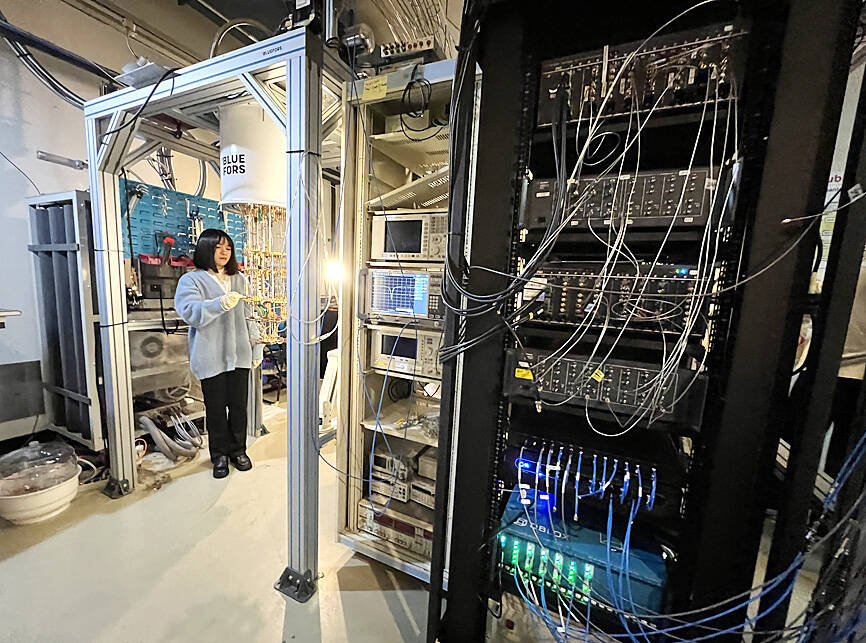A team at the Industrial Technology Research Institute (ITRI) has found a way to use a microwave integrated circuit (IC) and Taiwan Semiconductor Manufacturing Co’s (TSMC) 28-nanometer technology to develop a low-temperature-control IC module, which can potentially reduce the size of a quantum computer by 40 percent, the institute said on Wednesday.
The National Science and Technology Council announced some of the progress it has made with Academia Sinica and the Ministry of Economic Affairs since 2021 in jointly developing quantum technologies.
The more quantum bits (qubits) a quantum computer possesses, the more information it can carry and the better it can work.

Photo: CNA
Sheu Shyh-shyuan (許世玄), a division director at the ITRI’s Institute of Electro-Optics and the head of a project on the key hardware of quantum computer subsystems, said that a quantum computer is equipped with a fridge, other devices and a crowd of cables for connections, which in combination can easily take up a whole room.
One qubit requires two to three cables, so if a 100-million-qubit system is to be realized, that would mean 300 million cables, with the size of the control device and the system for cooling scaled up accordingly.
As a result, power consumption would surge considerably, Hsu said.
It is for this reason that “minimization” is a trend in quantum computing, he said.
He said that his team utilized microwave IC design and TSMC’s 28-nanometer process technology, which are national strengths, to develop low-temperature (minus-269°C) control chips and modules to make control devices smaller and place them in a low-temperature fridge.
The design could reduce the size of the system by about 40 percent, highlighting the potential for it to be commercialized, Hsu said.
The minimization of the module can also shorten the route needed for quantum signal transmission and reduce the interruption of noise, Hsu added.
The module also cuts power consumption by more than 50 percent compared with results published by major international developers, making it an advantage for developing multiple-qubit superconducting quantum computers, he said.
The technology could be transferred to domestic companies, Hsu said, adding that some have already made inquiries about possible cooperation.
Executives from Finland-based quantum computer company IQM visited Taiwan last year to discuss possible cooperation, Minister of Science and Technology Wu Tsung-tsong (吳政忠) said, adding that Taiwan, despite competing globally with limited funds, has achieved substantive results in quantum technology and is likely to become one of the nations with most potential to excel at it.

Taiwan has received more than US$70 million in royalties as of the end of last year from developing the F-16V jet as countries worldwide purchase or upgrade to this popular model, government and military officials said on Saturday. Taiwan funded the development of the F-16V jet and ended up the sole investor as other countries withdrew from the program. Now the F-16V is increasingly popular and countries must pay Taiwan a percentage in royalties when they purchase new F-16V aircraft or upgrade older F-16 models. The next five years are expected to be the peak for these royalties, with Taiwan potentially earning

STAY IN YOUR LANE: As the US and Israel attack Iran, the ministry has warned China not to overstep by including Taiwanese citizens in its evacuation orders The Ministry of Foreign Affairs (MOFA) yesterday rebuked a statement by China’s embassy in Israel that it would evacuate Taiwanese holders of Chinese travel documents from Israel amid the latter’s escalating conflict with Iran. Tensions have risen across the Middle East in the wake of US and Israeli airstrikes on Iran beginning Saturday. China subsequently issued an evacuation notice for its citizens. In a news release, the Chinese embassy in Israel said holders of “Taiwan compatriot permits (台胞證)” issued to Taiwanese nationals by Chinese authorities for travel to China — could register for evacuation to Egypt. In Taipei, the ministry yesterday said Taiwan

POSITIVE DEVELOPMENT: Japan and the US are expected to hold in-depth discussions on Taiwan-related issues during the meeting next month, Japanese sources said The holding of a Japan-US leaders’ meeting ahead of US President Donald Trump’s visit to China is positive news for Taiwan, former Japan-Taiwan Exchange Association representative Hiroyasu Izumi said yesterday. After the Liberal Democratic Party’s landslide victory in Japan’s House of Representatives election, Japanese Prime Minister Sanae Takaichi is scheduled to visit the US next month, where she is to meet with Trump ahead of the US president’s planned visit to China from March 31 to April 2 for a meeting with Chinese President Xi Jinping (習近平). Japan and the US are expected to hold in-depth discussions on Taiwan-related issues during the

‘LIKE-MINDED PARTNER’: Tako van Popta said it would be inappropriate to delay signing the deal with Taiwan because of China, adding he would promote the issue Canadian senators have stressed Taiwan’s importance for international trade and expressed enthusiasm for ensuring the Taiwan-Canada trade cooperation framework agreement is implemented this year. Representative to Canada Harry Tseng (曾厚仁) in an interview with the Central News Agency (CNA) said he was increasingly uneasy about Ottawa’s delays in signing the agreement, especially as Ottawa has warmed toward Beijing. There are “no negotiations left. Not only [is it] initialed, we have three versions of the text ready: English, French and Mandarin,” Tseng said. “That tells you how close we are to the final signature.” Tseng said that he hoped Canadian Prime Minister Mark Carney